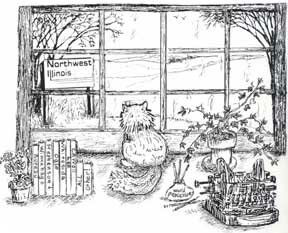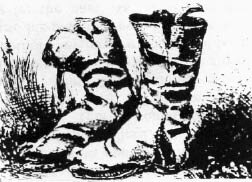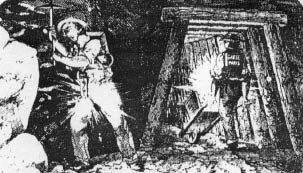
Discover rewarding casino experiences. 
|
Of how Bill Goss had to drop down the chimney of the cabin within and, too, of how he’d been out hunting and was slaughtering a deer when he sensed movement in the brush. Casually, reloading his gun, he eased the deer to the ground and began to slide his feet ever so slightly for purchase for a run at the fort. He dodged and swayed, and as the history book author later wrote, “His running has never been equaled on the Upper Mississippi!” So fast was he that the bullets aiming at him merely cut the leather strap holding his powder horn, a near-miss. He changed course, making his erratic way along the bluff above the fort where he rolled into a cave where he hid until nightfall. The cave ever after took his name well into the twentieth century, “Upton’s Cave,” when it had become part of a state park. Nearly two decades later were there stirrings of curiosity about Bob Upton because here he was now in some new, clean deerskin breeches and vest a couple spankin’ sharp shirts and a clean-shaven face? Then it came to the residents of the savannah. He was going to become a “49’er.” Upton, like many another Northwesterner, was going on exodus West. Once a frontiersman always a frontiersman. As the saying goes, you take a frontiersman out of the frontier but you can’t take the frontier out of the frontiersman. Or something like that.
President Zachary Taylor had addressed Congress in December of 1848 about the fabulous discovery of gold in the Pacific Territory of California. It was said that ships’ crew members had deserted when reaching port at San Francisco to go search for gold ... Labor commanded exorbitant prices. Every pursuit, save hauling gold, had been abandoned. Even Congressmen left the marbled halls of the capitol to go off West. So it was no wonder a humble miner like Bob Upton would receive the call. He was in one of the first companies to leave Carroll County to take off for the new El Dorado ... Pliny Taylor, Tom Rhodes, L.D. Pierce, John Barber, Joe Taylor, Harmon Brown, Frank Gilbert, Ira Buckamon, Levi Wilson, John Armstrong, W.C. Pierce, George Jenks, Frank Hitchcox ... It was a healthy number in one party but with an outdoors man such as Upton, the group was most fortunate, they felt, as Bob probably knew survival upside down and backwards. Announcement being made in December it was understood that no overland route could be executed until better weather came along. But that didn’t mean that an ocean voyage couldn’t be under taken. Philo Cole, later of Carroll County, went to Boston to take a ticket on a vessel to go around Cape Horn at the tip of South America, then up along that continent to the port of San Francisco. It was as dangerous in its way as to go overland and as lengthy in time ... Six months. But time was a’wastin’. The port of New York City, too, was embarkation to Cape Horn or to the Isthmus of Panama where one must walk that narrow land bridge because it would be decades before a canal could be dug. Sail to Vera Cruz in Mexico and walk to the Pacific to find a ship north, Robert Moore walked the Isthmus. Philo Cole made more money raising potatoes in the gold fields than he ever did panning for the yellow stuff. But newspapers reported that “yellow fever” prevailed and people were in a rage to Go West. Samuel Preston, a pioneer of the 1830’s wrote in his memoirs that “The rush to the Gold Fields of California took more people in 1850 from the county than were added to it.” The first of the gold seekers from Carroll County set off March 27, 1849. From Mt. Carroll ... Ten or twelve men including John Pierce, William Yontz, Richard Owings, Gilbert Marks, Larkin Lindsey and others not named. This party alone suffered a number of tragedies that would be a good plot for any movie about the period. There were incidents that were life-altering changes occurring as the world turned in its age-old manner. Of this group, Owings and Lindsey were elected to go ahead of the excursion to buy and arrange the supplies for the trip; this at St. Joseph, Missouri, the usual depot for setting off West. While there, Lindsey contracted cholera and died, the disease being only one of the scourge without treatment. The group pressed on. Samuel Spang, one of this group, was said to be of great assistance to Judge Emmert’s party that set out later. He helped them settle at places with good prospects for gold and otherwise adapt to the western site. It was said of Spang that he worked the gold fields for some twenty years until the end of that time he finally discovered a vein of the mineral at the top of a mountain. He had to take the “dirt” down hill a mile to wash it and then, of course, return. But he was thought to have taken in $40,000 of gold in eight days. However, report said of him, “He lost what he had accumulated and like many of those who acquire riches, he died poor.” On reaching the Platte River, the first of the Carroll County “49’ers” fixed their wagon box into a kind of boat in which to store all their supplies and float it over, there being no ferry as yet. The current, however, took the box out of the guidance of the inexperienced travelers and William Yontz, not able to swim, went into the river. Pierce who was an expert swimmer plunged in to save his brother-in-law but was swallowed up by the rapidly rising waters enlarged by spring rains. Two men drowned. Family and friends back in Carroll County were horrified by the tragedy. The even may have sobered some of those who’d so eagerly planned to go westward. Another odd incident happened to a member of the same group. A man named Barber, Description of him said that he had a real penchant for making money. He was immediately successful in the mines and being a dutiful husband regularly sent money home to his wife in Mt. Carroll. How gossip could have traveled so far and fast is a puzzler. It may have been one of those “what if” kind of rumors but someone told Barber that the man his wife was living with (??) was spending the money he sent home. Oh, he was angry. One day he again received a letter from the wife. He couldn’t read so he tore up the letter then and there. Repenting, he murmured that he’d give a $100 to have that letter whole again to see what his wife had to say.
The well-known county schoolmaster, D.G. Shottenkirk, was not one to let a hundred dollars slip away so swept up the remnants and fixed them together as best they could be even though jigsaw puzzles weren’t popular yet! Reading the result to Barber it was found that it was a sweet missive from the wife and had nothing to say about money as some had urged in the past. But Barber was done. He never sent the wife another penny and stayed on to live in California, taking another wife, it was reported. To that first party of Carroll County “49’ers” alone there had occurred disease, drowning, divorce (we assume). If going off two thousand miles weren’t life-changing event by itself in a day when people rarely traveled fifty miles from the home hearth, the three d’s were. They likely wouldn’t have occurred had the gold seekers stayed here in Carroll County. But then change happens and rightfully so. The Gold rush drew the itchy foot, the adventurous, the unsettled and the old-timey frontiersman like Bob Upton who didn’t let an incident pass that he could take advantage of. That’s what makes history. Next week.
|






